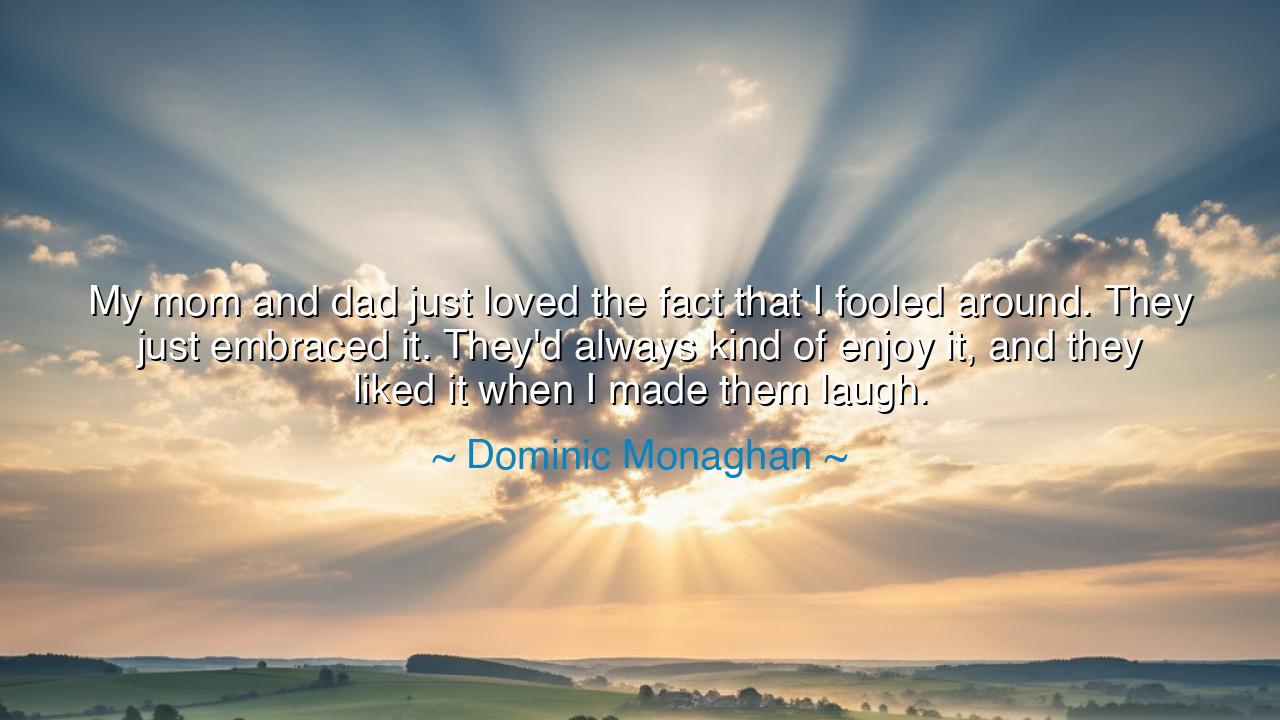
My mom and dad just loved the fact that I fooled around. They
My mom and dad just loved the fact that I fooled around. They just embraced it. They'd always kind of enjoy it, and they liked it when I made them laugh.






The words of Dominic Monaghan, “My mom and dad just loved the fact that I fooled around. They just embraced it. They'd always kind of enjoy it, and they liked it when I made them laugh,” carry the warmth of childhood, the memory of love freely given, and the seed of a destiny nurtured by joy. In this reflection, Monaghan speaks of the sacred role of parents: not as rigid molders of behavior, but as cultivators of spirit, encouraging the spark of playfulness that would one day grow into the flame of artistic expression.
The origin of this thought lies in the household of his youth, where laughter was not scorned as frivolity but welcomed as nourishment for the soul. Too often, children who “fool around” are silenced, their energy seen as distraction. Yet in Monaghan’s case, his parents saw in this playfulness not trouble but potential. They allowed humor to bloom, recognizing that to make another laugh is not only entertainment but a form of connection, of healing, of truth disguised in mirth. This acceptance became a foundation for the path he would walk as an actor, storyteller, and performer.
This truth finds echoes in history. Think of Socrates, who was accused by his critics of mocking and ridiculing, yet who used irony and playful questioning to uncover the deepest truths. Or consider the great court jesters of medieval times, who, under the veil of humor, could speak truths to kings that no advisor dared. In every age, the ability to make others laugh has been more than diversion—it has been a form of wisdom, a tool of survival, and sometimes, the only way truth could be spoken aloud. Monaghan’s parents, by encouraging his humor, gave him the courage to enter this ancient lineage of storytellers and truth-bearers.
There is also something deeply emotional in the fact that his parents embraced his laughter. For in a child’s eyes, the smile of the parent is both reward and reassurance. To be celebrated for one’s joy rather than silenced for it gives the child a message: your spirit is good, your light is needed. In this way, his parents gave him not only love but also freedom—the freedom to explore his personality without fear, to trust that what made him unique would not be crushed, but cherished.
Yet behind this memory lies a teaching about the importance of family acceptance. Had his parents rejected his playfulness, his path might have been different—perhaps stifled, perhaps darker, perhaps robbed of confidence. But because they chose encouragement over suppression, their son grew into his calling. This shows us the immense power of parental response: the way a single smile, a single word of support, can shape a lifetime.
The lesson here is clear: encouragement is a form of love that multiplies itself. When we affirm the gifts of others, even the small and playful ones, we give them courage to grow. Parents, teachers, friends—all who hold influence over the young—must remember that every spark of joy can become a fire of greatness, if only it is fanned rather than smothered. To laugh with a child is to water the seed of their future.
Practically, this means cultivating homes, classrooms, and communities where creativity and humor are honored. Do not rush to silence what seems like foolishness, for foolishness often hides genius. Listen for the laughter, cherish it, and recognize its power to heal. And for those who carry the gift of humor, do not underestimate it—your laughter may be the medicine another soul desperately needs.
Thus, Dominic Monaghan’s words become more than a recollection of childhood—they become a teaching for all generations. To laugh with one another is to affirm life; to encourage joy is to strengthen destiny. Let us then be like his parents: embracing, supporting, and celebrating the playful spirit, for in that spirit lies the foundation of courage, creativity, and love.






AAdministratorAdministrator
Welcome, honored guests. Please leave a comment, we will respond soon